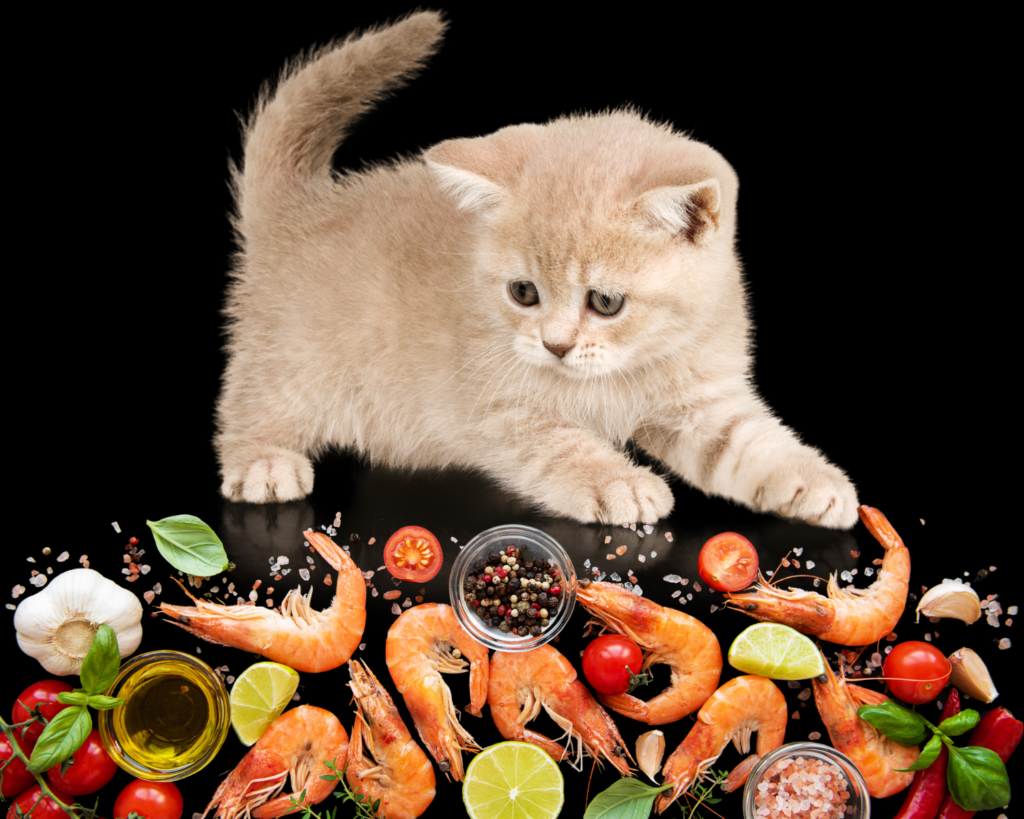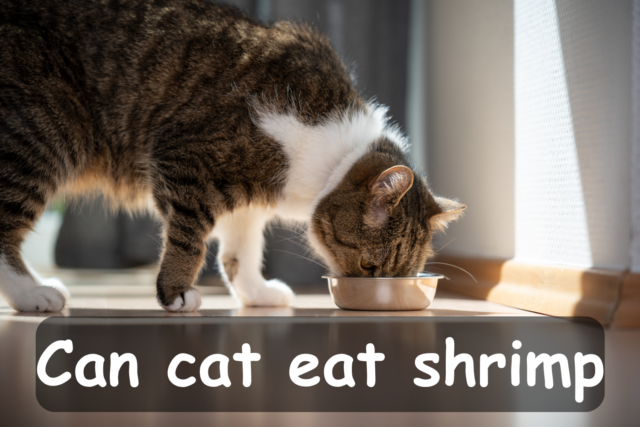Many of us have a query in mind about can cats eat shrimp. As a pet owner, it is important but a little difficult to find out whether your feline friend likes shrimps or not. Before finding out the answer to this question, you should find out if shrimps are good for their health.
Many people don’t understand that some foods for humans are not for cats. Cats have a very delicate digestive system, and that reason is enough to know whether can cats eat shrimp. Cats are carnivorous animal and loves seafood, but before feeding shrimp to your feline friend, pet owners must understand some facts related to shrimps.
In this article, we will try to find out the benefits and disadvantages of shrimps in cat life. So, check out the article to see how shrimps affect your cat.
Can Cats Eat Shrimp
The answer to the question Can cats eat shrimps is a big yes. Shrimps can be in cat food, but with some considerations, just like dogs can eat shrimps but with care.
According to Toki Tover, a USAF Veteran, feeding your domestic cat shrimps is a way to mimic its natural food source. Shrimps are a key component of the carnivorous feline diet in the wild.
According to Dr. Holloway, a Cat and Relief Veterinarian at Aloha Animal Hospital, Cats are obligate carnivores because their bodies need to derive nutrition from a meat-based diet. They need a higher protein intake as compared to dogs and ringtail cats, which are omnivores and can have a broader range of foods, including grains and plants.
In addition to daily food, you can add treats on a daily basis, but not more than a quarter. For instance, if your cat's daily food consumption is 1 cup, the maximum amount of treats should not exceed 1/4 cup. Regarding shrimps, you should limit shrimp treats to no more than 10% of your cat's daily food intake.
Benefits Of Shrimps In Cat’s Life
Apart from the fact that your feline loves shrimp or not, it has several benefits that make it a healthy snack for your cat.
Suitable Cholesterol Content
Too much shrimp is not beneficial because of the amount of cholesterol it contains, which is 85% higher than other seafood. If your cat eats too much shrimp, the cholesterol increases, which leads to hyperlipidemia, a condition where the cat’s blood has a higher fat level than the normal range.
On the other side, cholesterol is important for the creation of cell membranes, steroid hormones, vitamin D, and bile acids. So, a moderate amount of cholesterol ingestion is necessary for your feline friend. Remember that your cat should be healthy enough to digest it properly.
Low Calories
Shrimp is low in calories. This fish food has 84 calories in every 3-ounce serving. Shrimp should be part of a cat’s weight loss diet. If your feline cat is overweight, add shrimp to its weight loss management. Moreover, shrimp also has minerals and vitamins, which are helpful in your cat’s immune system and brain development.
Act As Antioxidant
The red color of shrimp is due to Astaxanthin, which is found in algae. As shrimps eat algae a lot, they are rich in Astaxanthin, which acts as an antioxidant when cats eat shrimp. Moreover, Astaxanthin also protects cat’s body cells by stopping free radicals to damage them.
Astaxanthin is beneficial as it reduces inflammation, prevents arthritis and cancer, improves heart health by lowering blood pressure and reducing triglycerides, improves cognitive function and memory, boosts the immune system, and protects cats from infection.
However, one disadvantage is that Astaxanthin interferes with the absorption of vitamin K, which is necessary for blood clotting in some animals. Though some studies suggest that felines may be less susceptible to this situation, it is still necessary to feed shrimps to your cat in moderation.
Otherwise, Vitamin K deficiency can lead to excessive bleeding, even from minor cuts. Other problems include spontaneous bruising and internal bleeding, which leads to death due to blood loss.

Other Nutrients
Shrimp is tasty, and of course, it’s the taste for which your feline friend always tries to steal or grab it from your box. But the kitty doesn’t know how helpful it is for maintaining its health.
Shrimps contain some essential nutrients, like calcium, phosphorus, B12, and magnesium. These nutrients are necessary for cats’ health and musculoskeletal system development. Moreover, they also prevent bone degradation in aging felines.
Although shrimps are healthy for cats, they should not be given in the raw form. Instead, you can serve them cooked shrimp. The raw one has bacteria which leads to stomach ache or other problems. Moreover, always serve small samples of shrimp, not in large quantities.
Giving small samples is not dangerous, yet they are cooked. But remember, while cooking shrimp for your cat, never use oils or seasonings.
Shrimps contain omega-3s, a good nutrient for boosting feline's heart health, and omega-6 fatty acids. The additional nutrient, choline, helps in the proper functioning of the heart, brain, and skin health. Moreover, it also prevents Alzheimer's disease in aged cats.
Disadvantages Of Shrimp For Cat
People ask the question Can cats eat shrimp? Because they are concerned about the potential harm the shrimp cause to cats. Although shrimp are safe snacks to eat for cats, they still come with some disadvantages.
Bacteria
Seafood is the first love of cats, but not everything from the sea is healthy for your cat. As cats love fresh meat, they are always fond of raw shrimp, regardless of the fact that it isn’t safe because of the presence of vibrio bacterium. Vibro is the cause of health issues like cholera and gastritis. Studies suggest that there are 100 different vibrio strains, and they can often develop resistance to antibiotics.
According to Dr. Woodnutt, a small animal veterinarian and cat behaviorist, if your kitten goes wild for these red snacks, peel and cook the shrimp irrespective of the fact that they can eat it in raw form also.
Potential Allergies
Cats are also allergic to many things, like their human parents. Sadly, their favorite snack may also cause them to develop allergies to cats. Shrimp causes gastrointestinal problems, which lead to diarrhea, vomiting, etc. If your cat shows any sign of allergy after eating shrimp, it’s best to stop feeding them and immediately take it to its vet.
Contaminants
Contaminants like mercury or antibiotics are also present in shrimp. So, feeding your cat too much shrimp will cause an accumulation of these contaminants, which will lead to further health problems.
Digestive Problems
Another problem with this seafood is its tough shells, which are difficult to digest. As cats are not crustaceans active hunters, they can tolerate small quantities of peeled shrimp, but not raw ones. Ingestion occurs, and cats are prone to problems like obstruction and constipation.
Wernicke-Korsakoff Syndrome
Eating too much shrimp can also cause low levels of thiamine (vitamin B1), which is essential for various bodily functions, including nerve function, energy metabolism, and the production of red blood cells. When the body doesn’t have the required thiamine, it can lead to thiamine deficiency syndrome (Wernicke-Korsakoff syndrome); its neurological symptoms include:
- dilated pupils
- Impaired vision
- Seizures
- Ataxia (brain, nerve, or muscle damage cause Impairedness)
- Tremors
- poor balance
- It may also cause feline death
Can Cats Eat Dried Shrimp?
Dried shrimp are healthy for cats if they are fed in moderation. As dried shrimp often contain higher levels of sodium than fresh shrimp, there are chances that too much feeding can cause lethargy, vomiting, diarrhea, and, in severe cases, hypernatremia (high levels of sodium in the blood), which can lead to seizures, coma, and even death. So, avoid shrimp that is labeled as “high in sodium” or “salted.” You can check sodium content from the nutrition label or contact the manufacturer.
How To Cook Shrimp For Cats?
Can cat eat shrimp raw? Feline parents mostly ask this question. And the simple answer is no. Then, in what way can you feed your cat the most tasty snack? Can cats eat cooked shrimp? Yes, they can, but not from the plate you have cooked for yourself with oil and seasoning.
To cook shrimp for your cat, you should follow the following recipe to make it healthy and safe for your cat.
- First, wash the shrimp.
- Remove the shrimp’s shell, head, and tail, and remember to devein the shrimp and remove its digestive system.
- You can boil, bake, or steam the shrimp instead of frying them and serve it plain.
- Don’t add any seasoning, and don’t feed your cat heavily salted or breaded shrimp.
- Don’t use any sauce during or after cooking.
FAQs
Can cats eat shrimp tails?
Yes, cats can eat shrimp tails, but you should remove tails before feeding shrimps to your cat, as they can be a choking hazard.
Can cats eat shrimp shells?
No, cats should not eat, and you must not feed them shrimp shells. The shells can be difficult for them to digest and may cause an intestinal blockage.
Can cats eat shrimp heads?
No, felines should not eat shrimp heads. The heads may contain harmful bacteria that can cause sickness.
Can cats eat shrimp cooked?
Cats can eat cooked shrimp, and you should feed them shrimp after cooking thoroughly and without seasoning it with any spices or oils.
Can cats eat frozen shrimp?
No, you can’t give frozen shrimp to your cat until you have thawed and cooked it thoroughly. Still, it is advisable not to feed your cat frozen shrimp.
Can cats eat raw shrimp?
No, cats should not eat raw shrimp, and you should avoid feeding raw ones to your feline friend. The raw shrimp may contain harmful bacteria that can make your cat sick.
Conclusion
Shrimps are healthy for carnivorous felines if fed in moderate quantities. They are tasty and full of nutrition but have some disadvantages that are easy to control if you give thoroughly cooked fresh shrimp to your cat.




![Turtle Tank Setup: The Ultimate & Step by Step Guide [2023] Turtle Tank Setup](https://petinfomax.com/wp-content/uploads/2023/03/Turtle-Tank-Setup-100x75.jpg)
